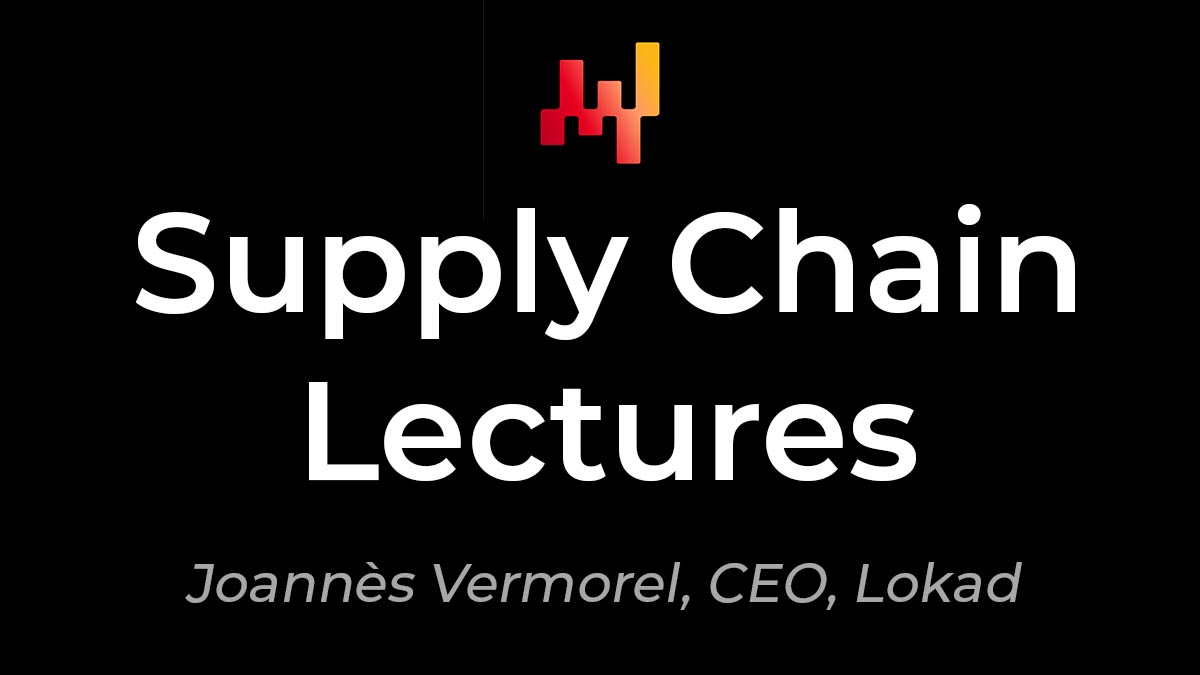Supply Chain Lectures, but why?
Last week, I announced that I will be starting a series of live Supply Chain lectures (register here for the first session). With over 200 registered attendees, it has gone beyond my expectation for an event announced at such a short notice. I will do my best not to make a fool of myself in front of this crowd.

In this post, I would like to share some insights into my motivations, as a CEO, for undertaking such a series of lectures. There are four key challenges faced by Lokad:
- Attracting the most brilliant minds
- Raising market awareness
- Delivering an outstanding value
- Upping the SCM game
(1) Any half-competent manager knows that, in order to win, having the best team players in town is a fantastic advantage. Yet, few companies are actually acting on this insight1. In order to attract brilliant minds, one needs to give them something to work on, ideally something difficult and meaningful. For example, this is what Google is doing - with considerable success - with TensorFlow. Unfortunately, supply chains don’t benefit - yet - from the same degree of hype than, say, artificial intelligence, which results in (much) fewer job applicants. As a rough empirical observation, Lokad receives about 100x more requests to conduct machine learning PhDs than supply chain PhDs. Naturally, the two perspectives are complementary, but as far as Lokad is concerned, this ratio is just wrong. Thus, these lectures are an attempt of mine to make supply chain more attractive to young, brilliant minds in the hope that, in turn, we will get even better applicants2.
(2) It’s unfortunate but the mainstream supply chain theory does not bring the performance one could have hoped for (this point will be addressed in my first lecture). Thus, at Lokad, we had to develop an alternative supply chain theory. While this theory works in practice (nice!), it departs quite radically from the mainstream theory. As a result, it’s a great source of confusion for our prospects. It’s not nothing like what they expect3, and it takes quite a few meetings to dispel the idea that we aren’t raving lunatics, and that there is a method behind the (apparent) madness. These lectures will be the opportunity to provide a coherent presentation of our alternative views on supply chain. Hopefully, the quality of the RFPs that we receive will improve in the future. Too frequently, RFPs are framed in ways where Lokad would have no option but to sell the bullet that some (large) prospect intends to use to shoot its own feet.
(3) Unlike most supply chain software vendors, Lokad has its skin in the game. We take ownership of the final suggested decisions (how much to order, how much to produce, move the price up or down, etc.). While it’s always a highly collaborative effort with the client company, we do not deflect our own responsibilities4 to our clients’ supply chain teams when our suggestions are numerically wrong. As such, the skills and experiences of my own teams of supply chain scientists at Lokad are crucial. These skills are acquired, not innate. Thus, these lectures are also turned inward. I intend to use them as training materials for the new recruits at Lokad. This is the privilege of running a growing company: there is a constant stream of inexperienced people to nurture so that they become more than their previous selves.
(4) Amazon is the living proof that supply chain can be more than a mere support function. Supply chain is more than “logistics+forecasting”. It can be accretive, bringing a massive value to the table for companies. When companies are treating supply chain as a “dumb” cost center, they invariably end-up framing the challenges in ways where, by design, nothing really good will ever emerge from supply chain. The mainstream supply chain theory doesn’t provide a credible perspective why supply chain could be anything but cost optimization. Thus, these lectures intend to create awareness that there is a higher form of supply chain out there, and that this form does not abide by the same rules. Naturally, Lokad, being positioned in the middle of this, is not just a fortunate coincidence.
My first lecture will be on November 25th. I will do my best to answer questions raised via the YouTube chat at the end of each lecture. Brutal, but relevant, questions are my favorite.
-
Setting up a ping pong table - or foosball - somewhere in the offices does not qualify, in my book, as a serious attempt at hiring brilliant minds. ↩︎
-
Some of our recent achievements are a testament to what Lokad has been able to accomplish hiring-wise. Yet, the GAFAM of this world are more attractive than ever. Hiring-wise, they are my primary competitors. ↩︎
-
Last week, after two gruesome hours of tedious explanations with the executive team of a large Australian retail chain, one of the directors concluded that “Lokad is nothing like what we were expecting, but on second thoughts, it’s probably what we actually need”. This anecdote summarizes what “selling” Lokad looks like, when prospects have enough patience to hear me out. ↩︎
-
Spin a coin. Head, the software vendor wins. Tail, the software client loses. ↩︎


